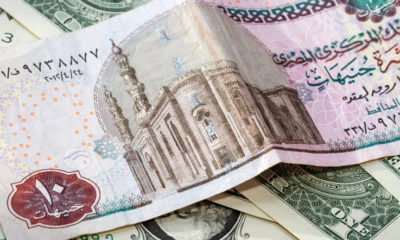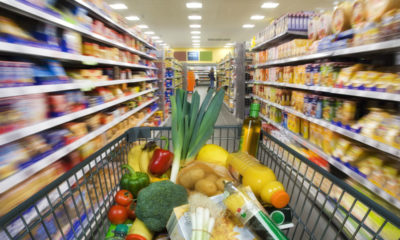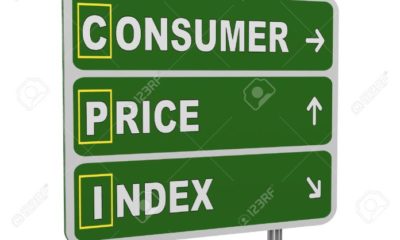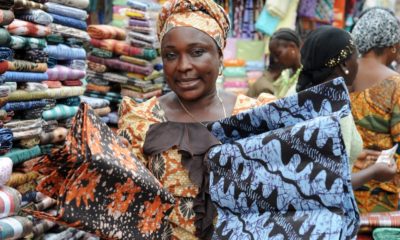Finance
Monetary Policy, Forex Interventions Keep Inflation Rate Low
Published
7 years agoon

- Monetary Policy, Forex Interventions Keep Inflation Rate Low
Encouraged by the prevailing recovery rate in the economy, the Central Bank of Nigeria (CBN) has reiterated confidence that the country will soon return to single digit inflation rate. The apex bank’s confidence is drawn from the declining inflation rate for more than one year, dropping from 17.2 per cent in April last year to 11.14 per cent last month, as shown in the latest data released by the National Bureau of Statistics (NBS).
Inflation, interest and lending rates are the three indicators taken seriously by the CBN. The regulator has never lost sight of the implication of a single miscalculation on any of them could cause the people and the economy.
That explains while the CBN-led Monetary Policy Committee (MPC) has kept benchmark interest rate steady at 14 per cent for over two years to curb inflation and support the naira.
Inflation statistics
Nigeria’s headline Consumer Price Index (CPI) (inflation) has sustained a decline (which started in 2017) for 18 consecutive months. It (inflation) was 11.14 per cent year-on-year in July, according to the NBS report.
The CPI measures the average change over time in prices of goods and services consumed by people for day-to-day living. In other words, it measures the inflation rate. The inflation report shows that the July figure moderated from 11.23 per cent year-on-year in June.
Meanwhile, on month-on-month basis, the headline index increased by 1.13 per cent as against 1.24 per cent the previous month, and remains the first month-on-month decline since February.
Food inflation rose by 12.85 per cent year-on-year in the review period, lower than the 12.98 per cent year-on-year recorded in June.
“Notably, the highest increase was recorded in the prices of potatoes, yam and other tubers, vegetables, bread and cereals, fish, oils and fat and fruits. On month-on-month basis, food inflation increased at a slower pace of 1.40 per cent, compared to the 1.57 per cent recorded in the previous month”, the NBS showed.
Core inflation was 10.2 per cent year-on-year during the review period, as against 10.4 per cent in June. The highest increases were reported in the prices of medical services, carpets and other floor coverings, vehicle spare parts, domestic services and household services, pharmaceutical products, paramedical services, hairdressing saloons and personal grooming establishment, dental services, motor cars and fuels and lubricants for personal transport equipment.
On the average month-by-month basis, the core index increased at a slower pace of 0.81 per cent, 22 basis points below the 1.03 per cent reported in June.
According to the NBS report, the CPI measures the average change over time in prices of goods and services consumed by people for day-to-day living. The construction of the CPI combines economic theory, sampling and other statistical techniques using data from other surveys to produce a weighted measure of average price changes in the Nigerian economy.
According to the NBS, the composite food index rose by 12.85 percent in July, compared to 12.98 per cent in the previous month. The figure represents the 10th consecutive decline in year-on-year food inflation since September 2017.
This rise in the food index was caused by increases in prices of potatoes, yam and other tubers, vegetables, bread and cereals, fish, oils and fat and fruits. On month-on-month basis, the food sub-index increased by 1.40 per cent in July, down by 0.17 per cent points from 1.57 per cent recorded in June. This represents the first-time month on month food inflation has declined since February 2018.
The average annual rate of change of the food sub-index for the twelve-month period ending July over the previous 12-month average was 17.10 per cent, 0.65 per cent points from the average annual rate of change recorded in June (17.75) per cent.
CBN Governor Godwin Emefiele said that increased spending from the N9.12 trillion ($25 billion) 2018 Budget and the build-up to next year’s election would lead to more price pressure.
“There are concerns about inflationary pressure building up towards the second half of the year in part because of the bigger than proposed budget,” Yvonne Mhango, an economist at Renaissance Capital in Johannesburg, said.
MPC input
The CBN-led Monetary Policy Committee (MPC) did not tamper with the existing policy rates at its meeting last month. The committee took measures that will not in any way disrupt foreign capital flows ahead of the 2019 general elections.
A report from the Economic Intelligence Unit of Access Bank Plc said the committee retained Monetary Policy Rate (MPR) – benchmark interest rate at 14 per cent, given the anticipated expansionary impact of fiscal spending following the signing of the 2018 Budget. The committee also retained the Cash Reserve Requirement (CRR) at 22.5 per cent; Liquidity Ratio at 30 per cent and maintain the foreign exchange policy, which has brought stability and boosted market liquidity.
Managing Director, Afrinvest Limited, Ike Chioke, said the MPC kept a delicate balance between growth and price stability, and maintained status quo on all policy rates in order to avoid upsetting the current economic momentum.
He said: “Our position is on a balance of factors underscored by careful analysis of sustained positive conditions in global commodity markets alongside emerging market risks and continued disinflation amid steady growth momentum.”
Chioke said that going by the minutes of the MPC meeting in May, members continued to keenly watch developments in the global financial and commodity markets, given the connection to Nigeria’s external position.
They (MPC members) said: “Although no material change has occurred since the last meeting, mixed market sentiments prevail. In the commodity markets, oil prices remained favourable, though slightly lower at $73/barrel compared with a year-to-date high of $80/barrel as OPEC and its allies, parties to the output cut deal, agreed to boost supply by 1mb/d.
“Saudi Arabia and Russia with excess output capacities are expected to be the biggest gainers from this decision which is anticipated to occasion a slight downward global oil price correction. Nonetheless, we believe conditions will continue to favour Nigeria’s fiscal and external balance positions. In the same vein, foreign capital reversals have continued unabated in emerging markets though with tapered impact on Nigerian assets.”
According to Afrinvest, the stable outlook on oil prices is expected to prop the capacity of the CBN to keep defending the domestic currency with the exchange rate of naira to the greenback stabilising at N305.85/$1.
“Foreign reserves accretion – which slightly moderated 0.6 per cent to $47.4 billion from $47.7 billion as at the May MPC Meeting due to increased forex demand – was supported by improved domestic oil production with daily output at 1.7 million barrel/day,” he added.
The exchange rate continues to hold steady at N360/$ in both the Investors’ and Exporters’ FX window and parallel markets, supported by stable foreign reserves that have sustained CBN’s intervention amid the exit of portfolio investors.
CBN dollar, Yuan interventions continue
The naira has been continuously strengthened by the CBN dollar and Yuan interventions and other policy initiatives, including the introduction of the Investors’ & Exporters’ Forex Window, which has brought a convergence in the market, keeping the naira stable at N362 to the dollar in the parallel market.
The economy has also enjoyed a major forex inflow in recent months with over $51 billion recorded in the I&E FX Window. The I&E Forex Window, also called willing-buyer willing-seller window, allows foreign investors to find buyers for their dollars at a mutually-agreed price.
The introduction of the I&E Forex Window was followed by continuous interventions by the CBN to strengthen Deposit Money Banks (DMBs) and the Bureau de Change (BDC) operators to meet forex demand at the retail end of the market.
The naira now exchanges at N362 to dollar at the BDC and parallel market. The official rate for the local currency stood at N305.6 to dollar.
Already, the CBN has asked banks to submit bids for the Chinese Yuan in line with its determination to meet forex demands at the retail end of the market.
The CBN sold 69.86 million Yuan (about $10.16 million) in its first auction of the Chinese currency. It recently injected $340 million into the interbank retail Secondary Market Intervention Sales (SMIS). This is in addition to the sale of 69 million Chinese Yuan (CNY) on the spot and short-tenored forwards.
The figures obtained from the CBN showed that the United States (U.S.) dollar denominated interventions were only for concerns in the agricultural and raw material sectors.
According to CBN’s Acting Director, Corporate Communications, Isaac Okorafor, the sales in the Chinese Yuan were through a combination of spot and 15-day tenors.
Okorafor said the exercise, in line with CBN guidelines, were for the payment of Renminbi denominated Letters of Credit for agriculture as well as raw materials and machinery.
He identified the bids received from authorised dealers as part of the requests attended to, adding that Renminbi’s availability was sure to ease pressure on the local forex market.
Okorafor attributed the relative stability in the forex market to the continued CBN intervention as well as the sustained increase in crude oil prices in the international market.
The CBN spokesman restated the CBN commitment to ensure that all the sectors continue have unfettered access to the forex (in dollars or Yuan) required for businesses.
Last month, the CBN launched the sale of forex in Chinese Yuan, signaling the consummation of the Nigeria-China Currency Swap Agreement.
Okorafor said that the sale would be done through a combination of spot and short-tenored forwards, adding that the sale would be conducted through a SMIS window.
He explained that the window would be dedicated to the payment of Renminbi Denominated Letters of Credit for raw materials, machinery and agriculture.
He said: “Due to the peculiarity of the exercise, the CBN will not be applying the relevant provisions of its Revised Guidelines for the Operation of Inter-Bank Foreign Exchange Market, that is; the guidelines which direct that special SMIS bids be submitted to CBN through Forex Primary Dealers.
“The CBN will also not be applying the guidelines which provide that Spot FX sold to any particular end-user shall not exceed 1 per cent of the overall available funds on offer at each SMIS session.”
On the bid period, Okorafor said authorised dealers were requested to submit their customers’ bids from 9am to 12pm on weekdays, adding that any bid received after the stipulated time would be disqualified.
On funding, he said that authorised dealers were to debit the customers’ accounts for the naira equivalent of their bids. He added that the CBN would debit the dealers’ current account on the day of intervention to the tune of the Naira equivalent of their bid request.
Okorafor explained that there would be no predetermined spread on the sale of Yuan by the dealers to the end-users under the special SMIS-Retail window. He said that the dealers would, however, be allowed to earn 50 kobo on the customers’ bids.
He advised customers who were not willing to accept the settlement terms not to participate in the special SMIS – Retail, adding that Forward Bids would be settled through a multiple-price book building process and would cut-off at a marginal rate to be disclosed after the conclusion of the Special SMIS Retail process.
He also urged customers who were not willing to accept the terms of the forward rate not to participate in the Special Chinese Yuan SMIS Intervention.
Okorafor said that the regulator reserved the right not to make a sale if it had the impression that the exercise did not provide effective price for the determination of the Yuan to the exchange rate.
On April 27, the Federal Government signed a $2.5-billion Currency Swap Agreement with the People’s Bank of China. The agreement’s primary aim was to provide adequate local currency liquidity to Nigerian and Chinese industrialists and also assist both countries in their forex reserves management.
Anchor Borrowers’ Programme
In over two years of the implementation of the Anchor Borrowers’ Programme (ABP), a total of N55 billion has been disbursed by the CBN to over 250,000 farmers under the scheme. The ABP was launched in Kebbi State on November 17, 2015 by President Muhammadu Buhari.
It was designed to create economic linkages between farmers and processors, not only to ensure increased agricultural output of rice and wheat, but also to close the gap between production and consumption.
The CBN had earmarked N40 billion out of the N220 billion Micro Small and Medium Enterprises Development Fund (MSMEDF) for farmers at a single digit interest rate of nine per cent per annum.
Under the scheme, smallholder farmers can access loans ranging between N150, 000 to N250, 000 to assist them in procuring necessary agricultural inputs such as seedlings, fertilisers and pesticides, to help boost agricultural outputs and productivity.
Okorafor said that out of the N55 billion provided for the farmers, 80 per cent or N44 billion was given to rice farmers alone.
He stated that the need to provide rice farmers with adequate funding was to ensure self-sufficiency in the production of the commodity and to also ensure that Nigeria becomes a net exporter of the product.
Okorafor said: “Out of the N55 billion that we have spent on the Anchor Borrowers’ Programme, about 80 per cent has gone into rice production; and if you work out that mathematically, you will see that the multiplier effect of that money has been so great.
“It also goes to underscore the effectiveness and efficiency that the CBN has put into this programme. We have about 250,000, who have also cultivated close to 300,000 hectares of farmland, and you can see the impact on the street.”
Some of the 3, 509 farmers in Kwara State have begun to benefit from the first phase of the N1 billion 2018 ABP facilitated by the CBN and the Kwara State Government.
State Governor, Abdulfatah Ahmed, has said the N1 billion loan from the CBN to farmers in the state will boost agribusiness.
He also said that the loan, which is the first phase of the Kwara/CBN 2018 ABP, would increase food production as well as provide raw materials for industries. According to him, the programme will reduce Nigeria’s negative balance of payments on food imports.
The governor’s Special Adviser on Agriculture & Rural Water Support, Anu Ibiwoye, said that 500 maize farmers, 350 soya beans farmers, 250 cassava farmers and 150 rice farmers will get various sums as loans under the scheme.
He said that each farmer would receive farm inputs depending on the size of his farm.
Ibiwoye said: “Let me remind you today that this empowerment that you will receive is coming to you as loans. We hope that these inputs will be judiciously used and the loans paid back so that other farmers can benefit.
“The farmers shortlisted for the phase one of the scheme will begin to receive their inputs starting immediately after the capacity building session today.”
The ABP thrust is the provision of farm inputs in kind and cash to smallholder farmers to boost production of rice, maize, soya beans and cassava, as well as to stabilise inputs supply to agro-processors and address the country’s negative balance of payments on food.
Likewise, about 6, 670 rice farmers in Plateau State have received seedlings, fertilisers, herbicide, pesticide, water pumping machine and other rice farming inputs from the ABP introduced by the Federal Government.The Plateau State chapter of Rice Farmers Association of Nigeria (RIFAN) said that farmers were receiving their items for the past three weeks at the secretariats of Plateau Agricultural Development Programme (PADP) in Jos, Shendam and Mangu local government areas.
The Nigerian Incentive-Based Risk Sharing System for Agricultural Lending said about 250,000 direct jobs and 1.25 million indirect jobs have been created under the ABP.
Is the CEO and Founder of Investors King Limited. He is a seasoned foreign exchange research analyst and a published author on Yahoo Finance, Business Insider, Nasdaq, Entrepreneur.com, Investorplace, and other prominent platforms. With over two decades of experience in global financial markets, Olukoya is well-recognized in the industry.

You may like
-
Egypt’s Inflation Ticks Up But Rate Cut Still in View Amid IMF Support
-
Inflation and FX Pressures Drive Sharp Increase in Prices Across Sectors
-
Inflation Slows to 23.2% in February, Raising Hopes for Price Stability
-
CBN Expected to Maintain Rates as New Inflation Data Shifts Policy Outlook
-
Nigeria’s Inflation Rate Adjusted to 24.48% Following CPI Rebasing
-
Comercio Partners Predicts Inflation Between 15-20% in Base Case Scenario















